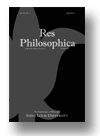
Res Philosophica
Scope & Guideline
Championing Quality Research in Philosophy
Introduction
Aims and Scopes
- Interdisciplinary Philosophy:
The journal explores philosophical issues that intersect with various disciplines, including ethics, aesthetics, political theory, and metaphysics. - Historical and Contemporary Analysis:
There is a consistent focus on both historical figures (e.g., Kant, Spinoza, Aquinas) and contemporary philosophical debates, allowing for a rich dialogue between past and present. - Applied Philosophy:
The journal features discussions on practical implications of philosophical theories, such as race-based affirmative action and ethical considerations in medical resources allocation. - Meta-Philosophical Inquiry:
Res Philosophica emphasizes meta-philosophical questions and theories, exploring the foundations of philosophical thought and its methodological approaches. - Cultural and Global Perspectives:
Papers often address philosophical ideas from diverse cultural contexts, highlighting contributions from non-Western philosophies, including Islamic and Confucian traditions.
Trending and Emerging
- Philosophy of Hope and Resilience:
A growing interest in the philosophy of hope, particularly as it relates to existential and ethical considerations, reflects contemporary concerns about human well-being and future possibilities. - Communicative Action and Pragmatics:
The exploration of communicative action, especially in the context of Jurgen Habermas's theories, has gained traction, emphasizing the importance of dialogue in ethical and political philosophy. - Posthumanist and Technological Ethics:
Emerging discussions around the ethics of technology, including human-robot interactions and the implications of cognitive enhancement, indicate a shift towards addressing modern technological dilemmas. - Decolonial and Global Philosophies:
There is an increasing focus on decolonial approaches and the integration of global philosophical perspectives, highlighting the significance of diverse voices in philosophical discourse. - Psychological and Cognitive Dimensions of Philosophy:
Themes involving the intersections of philosophy with psychology, such as self-deception and cognitive styles, are becoming more prominent, reflecting a trend towards integrating empirical findings into philosophical analysis.
Declining or Waning
- Traditional Analytic Philosophy:
There is a noticeable decrease in the publication of papers strictly adhering to traditional analytic philosophy, suggesting a shift towards more interdisciplinary and applied philosophical discussions. - Metaphysical Speculation:
Topics heavily focused on abstract metaphysical speculation, such as ontological debates without practical implications, have decreased in frequency, indicating a potential waning interest in purely theoretical discussions. - Normative Ethics:
While ethical discussions remain relevant, there seems to be a decline in papers specifically centered on normative ethical theories, as the journal increasingly favors applied ethical considerations. - Historical Exclusivity:
There is a reduction in papers that exclusively focus on historical philosophical analysis, as the journal encourages a blend of historical and contemporary themes.
Similar Journals
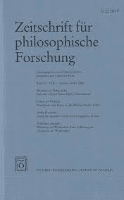
ZEITSCHRIFT FUR PHILOSOPHISCHE FORSCHUNG
Nurturing Intellectual Growth in the Realm of Philosophy.ZEITSCHRIFT FUR PHILOSOPHISCHE FORSCHUNG is a prestigious academic journal published by Vittorio Klostermann GmbH in Germany, dedicated to the interdisciplinary field of philosophy. With its ISSN 0044-3301 and E-ISSN 1439-2615, this journal has made significant contributions to the philosophical discourse since its inception in 1977, continuing its pursuit of excellence in scholarship through 2024. Recognized in the 2023 category quartiles as Q2 in Philosophy, it is ranked #498 out of 806 in the Arts and Humanities' Philosophy classification by Scopus, placing it in the 38th percentile. Although it currently does not offer open access options, its rigorous peer-reviewed articles serve to enrich the scholarly community's understanding of complex philosophical issues. ZEITSCHRIFT FUR PHILOSOPHISCHE FORSCHUNG plays a vital role in advancing philosophical research in a collaborative academic environment, making it a valuable resource for researchers, professionals, and students alike.
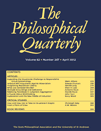
PHILOSOPHICAL QUARTERLY
Fostering Dialogue on Timeless QuestionsPHILOSOPHICAL QUARTERLY, a leading journal in the field of philosophy, is published by Oxford University Press, recognized for its commitment to advancing scholarly discourse since its inception in 1950. With an ISSN of 0031-8094 and an E-ISSN of 1467-9213, this prestigious journal is situated in the United Kingdom, reflecting a rich tradition of philosophical inquiry. The 2023 Category Quartiles rank it in the Q1 tier, demonstrating its substantial impact within the philosophy domain, supported by a Scopus rank of 130/806, placing it in the 83rd percentile of arts and humanities. While it does not currently offer open access, the journal remains a vital resource for researchers, professionals, and students seeking to engage with contemporary philosophical issues and theories. As it continues to publish insightful articles and critical discussions, the PHILOSOPHICAL QUARTERLY stands as a testament to the ongoing evolution and relevance of philosophical scholarship.

Kalagatos-Revista de Filosofia
Illuminating Contemporary and Historical ChallengesKalagatos-Revista de Filosofia is a distinguished academic journal published by UNIV ESTADUAL CEARA-UECE, focusing on a broad spectrum of philosophical inquiries and scholarly discussions. With an ISSN of 1808-107X and an E-ISSN of 1984-9206, this Open Access journal has been dedicated to disseminating high-quality research and fostering critical thought in the field of philosophy since its inception in 2004. Positioned as a vital resource for researchers, professionals, and students alike, Kalagatos encourages dialogues that traverse traditional boundaries in philosophical discourse. With its commitment to accessibility and quality, the journal plays a pivotal role in contributing to the philosophical landscape, making knowledge available to a global audience. The journal seeks to publish original research articles, reviews, and essays that address contemporary and historical philosophical challenges, nurturing a vibrant academic community engaged in meaningful exploration and reflection.
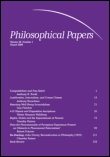
Philosophical Papers
Exploring the Depths of Human ThoughtPhilosophical Papers, an esteemed journal published by Routledge Journals, Taylor & Francis Ltd, stands as a pivotal resource in the field of philosophy. Having established its presence since 1972, this journal has converged a wealth of intellectual discourse and contributes to the continuous development of philosophical thought until 2024. With a prestigious Q1 category ranking in the arts and humanities, and a notable 86th percentile ranking in Scopus's philosophy category, it underscores its commitment to rigorous scholarship and influential research. Although Open Access options are not currently available, the journal remains a vital platform for philosophers, researchers, and students aiming to engage with pivotal philosophical debates and advancements. Set in the UK, Philosophical Papers exemplifies the intersection of tradition and innovation in philosophical inquiry, making it an indispensable reference for anyone dedicated to exploring the complexities of human thought and existence.
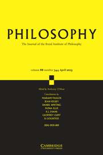
PHILOSOPHY
Unraveling Ideas, Inspiring DebatePHILOSOPHY, published by Cambridge University Press, stands as a premier journal in the field of philosophy, boasting a significant impact with a prestigious Q1 classification and an admirable ranking of #167 out of 806 in the Arts and Humanities category as of 2023. With a history that dates back to 1926 and continuing through 2024, this journal has established itself as an essential platform for disseminating groundbreaking research and innovative ideas in philosophical discourse. Although it does not offer open access, the journal's reach is substantial, contributing to scholarly conversations across various domains within the discipline. Researchers, professionals, and students alike benefit from a wealth of articles that explore critical philosophical questions, encourage rigorous debate, and present diverse perspectives. Access to PHILOSOPHY ensures engagement with leading-edge scholarship that shapes contemporary thought and advances understanding in this dynamic field.
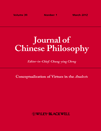
JOURNAL OF CHINESE PHILOSOPHY
Unveiling the Rich Tapestry of Chinese PhilosophyThe Journal of Chinese Philosophy, published by Brill, stands as a pivotal platform for the exploration and dissemination of research within the realm of philosophy, particularly focusing on traditional and contemporary Chinese thought. With a commitment to academic excellence, this journal has earned a reputation for its rigorous scholarship, as reflected in its Q2 category ranking in the field of Philosophy on Scopus, currently positioned at rank #337 out of 806 in Arts and Humanities. Since its inception in 1973, the journal has consistently engaged scholars, professionals, and students alike, featuring articles that deepen understanding and provoke critical discourse among various philosophical traditions. Although it is not open access, the journal's influential contributions and comprehensive reviews of emerging trends in Chinese philosophy make it an essential resource for anyone engaged in the study of this rich and diverse field. For subscription and access details, interested readers can refer to the publisher's website.

REVUE INTERNATIONALE DE PHILOSOPHIE
Challenging Ideas, Inspiring MindsREVUE INTERNATIONALE DE PHILOSOPHIE, published by REVUE INT PHILOSOPHIE, is a prestigious journal in the field of philosophy, based in Belgium. With an ISSN of 0048-8143 and an E-ISSN of 2033-0138, this journal has been a vital platform for philosophical discourse since its inception in 1983, successfully evolving through various phases until 2024. Despite currently being positioned in the Q4 category of Philosophy according to the 2023 rankings, it serves as an important venue for scholars and students alike, allowing for a diverse exploration of philosophical thought. Although it is not an Open Access publication, the journal fosters a rich environment for rigorous scholarly research and debate. By presenting articles that challenge and inspire, REVUE INTERNATIONALE DE PHILOSOPHIE ensures that it remains an essential resource for anyone engaged in philosophical inquiry.

Convivium
Promoting Global Access to Philosophical InquiryConvivium is a distinguished open-access journal published by the Universitat de Barcelona, Facultat Filologia, specializing in the field of philosophy. Since its inception, the journal has committed to fostering scholarly dialogue by providing a platform for innovative and critical research. Operating under an open-access model since 2007, Convivium ensures that its articles, which span a range of contemporary philosophical topics, are freely accessible to a global audience, thereby promoting the dissemination of knowledge. Despite facing challenges indicated by its current Scopus rank in the 2nd percentile of the Arts and Humanities, and its Q3 quartile in 2023, Convivium continues to thrive as an important resource for researchers, professionals, and students engaged in philosophical inquiry. With published volumes converging from 2009 to 2014, 2017 to 2018, and 2021 to 2023, the journal is poised to contribute significantly to the ongoing discussions and developments in philosophy.

VERIFICHE
Advancing Thought in the Realm of PhilosophyVERIFICHE, published by ASSOC TRENTINA SCI UMANE, is a distinguished academic journal hailing from Italy, focusing on the intricate field of Philosophy. With an ISSN of 0391-4186, this journal serves as a pivotal platform for scholars and thought leaders engaged in philosophical discourse, examining both theoretical and practical aspects of the discipline. Despite its classification in the Q4 category of the 2023 journal ranks, and a Scopus ranking of #602 out of 806 within the Arts and Humanities, it plays a significant role in contributing to philosophical knowledge and debate. The journal has matured over a significant timeframe, covering topics from 2014 to 2022, and is committed to fostering intellectual engagement among researchers, professionals, and students alike. Although currently not available as an open access journal, VERIFICHE remains an important resource for those seeking to explore the depth of philosophical inquiry and its applications in contemporary society.
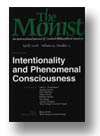
MONIST
Advancing Scholarly Conversations in PhilosophyMONIST is a prestigious academic journal published by Oxford University Press Inc, focusing on the intricate dialogues within the field of Philosophy. With an impressive impact factor that places it in the Q1 quartile of its category for 2023, MONIST stands as a leader in promoting high-quality research that bridges various philosophical traditions and methodologies. Established in 1973, the journal has consistently contributed to contemporary discussions by providing a platform for diverse philosophical inquiries and fostering rigorous scholarly debate. Although available through subscription options, MONIST engages a wide audience, including researchers, educators, and students who are deeply invested in advancing philosophical thought. Its Scopus ranking showcases its significant influence in the Arts and Humanities, positioning it at rank 119 out of 806 in its field, symbolizing an 85th percentile standing. With a commitment to excellence and innovation in philosophical scholarship, MONIST continues to be an essential resource for those seeking to deepen their understanding of philosophical issues in a rapidly evolving intellectual landscape.